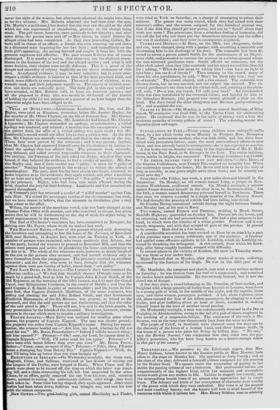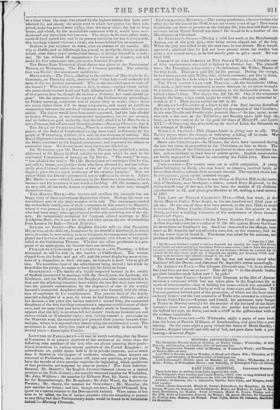THEATRICALS.—We perceive by the Edinburgh papers, that Mrs. Henry Siddons,
better known to the London public as Miss Murray; bade adieu to the stage on Monday last. She appeared as Lady Townly ; and at the close of the play, delivered a farewell address composed for the occasion by Sir 'Walter Scott. We cannot resist the temptation of paying to her merits the passing tribute of our admiration. Her professional talents' are unquestionably of the highest kind, while her manners and accomplish- ments would grace any station in life. Neither in tragedy nor comedy, can the metropolitan boards boast of an actress who approaches her in excel- lence. The delicacy and truth of her conceptions of character were worthy of the power with which they were embodied. Her voice is of the deepest and most touching beauty, and she knows well how to avail herself of the !at a time when the step was graced by the highest talents that have ever ._adorned it ; and among the many tests to which her genius has been sub- jected, none has proved more trying, than the name which she has so long borne, and which, by the associations connected with it, would have over- shadowed any reputation but her own. The stage, in its most palmy state, could ill have spared her, and in its present condition her loss is irreparable. She has long reigned without a rival ; site leaves behind her no successor.
Braham is just returned to town, after an absence of six mouths. His trip to Dublin and to Edinburgh has proved so profitable, that he is deter- mined, after thirty years' professional labour, to indulge himself in a holy_ day. He has refused all engagements for concerts or theatres, and will make his first appearance this year at tie Norwich Festival.
The Drury Lane Theatrical Fund dinner was given at the Freemasons' Tavern, on Wednesday. The Duke of Clarence presided. The subscrip- tion was liberal ; the amusement indifferent:
MYSTERIES.—The Times, alluding to the evidence of Miss Steele in the Commons, on Thursday nigh; observes that " that lady could evidently tell more if she was further questioned. Why is she not called upon to state all she knows ? Who is that person—a lady, it seems—against whose society she particularly warned Lord and Lady Ellenborongh ? Whatever the rank of that person may be, though she be even a Princess, her name should ap- pear." On the appearance of the report of the Parliamentary proceedings, on Friday morning, conjecture was of course busy at work ; where there are many claims there will be many conjectures, and many an invidious comparison between the merits of claimants was of course drawn in conver- sation. The choice would have been much narrowed, had the lady alluded to been a Princess, as Our contemporary insinuates ; but we are assured, and we believe on good authority, that the lady alluded to by Miss Steele is not a Princess, but a Peeresss of these k ing.doms.—Morning Chronicle, Apr. 3.
Tins DuicE or CusimmEnr„exin___There is a strange story in the Dutch papers, of the Duke of Cumberland having been voted to Coventry by the people of Wirtemberg, whither, it is said, he was desirous of retiring. His Royal highness's brother-in-law has, it is said, contradicted the reports about the Duke contained in the English newspapers, and requested his officers to contradict them. IVe do not know what reports are alluded to. • DR, BURROWS AND Mr. DAVIES.—Dr. Burrows has published a letter, addressed to Sir Henry Raiford, relative to the part which he took in the celebrated Commission of Lunacy on Mr. Davies. " The event," he says, " has falsified the verdict. He (Mr. Davies) now acknowledges that he was, and still is, insane, and justifies those who have affirmed it ; and has volun- tarily placed himself under the care of two of the physicians who, on the inquiry, gave the strangest testimony of his existing insanity." Now we rather think the Doctor's argument is not so colent as he deems it. Either Mr. Davies is sane—which is contrary to Dr. Burrows's hypothesis, or he is insane—and his testimony is not worth a farthing. All the madmen, and, we may add, all the fools, doctors or patients, ever we have met, thought themselves wise.
TnE MissEs BOTH.—Our readers will recollect the romantic but un- happy story of these unfortunate Hanoverian sisters. Perhaps the most ex- traordinary part of the story remains to be told. The newspapers carried the melancholy intelligence of their adventures in this country to Hanover, where it was perueed by a gentleman of high rank and considerable wealth, who had been many years ago attached to the only surviving one of the sis- ters. Ile immediately embarked for Eng-laud, offered marriage to Miss Adolphine Both, she is now his .wife, and they are on the eve of embarking from London for Italy.—British, AFFAIR OF FOLLY.—The Brighton Gazette tells us that Pea-green Rayne was, on the lath ult., bound over by the Sheriff of Edinburgle in which town, it seems, he now resides, to keep the peace, in consequence of a conteiri- plated duel between him and another gentleman with whom he had quar- relled at the Caledonian Theatre. Whether the other gentleman is a pea- green or an apple-green, the Gazette does not mention.
FEMALE SLAVE-MARKET AT ClIELTENHAM.—OR Thursday, a fellow attempted to sell his wife in the market at Cheltenham. The woman slipped from the halter, and got off; and the crowd displaying some symp- toms of a disposition to duck the mall, he thought it most wise to get off also. We sometimes hear of the schoolmaster being abroad ; but while he brandishes his primer, he seems to have left his birch at home.
ELOPEMENT.—The family of a highly respected baronet in the county of Stafford (connected by marriage with the Newdigates, the Ludfords, the Littletons, and the Wallhonses, the Bougheys, and other ancient families in that and the adjoining counties) have within the last few days been thrown into the greatest consternation by the elopement of one of the worthy baronet's unmarried daughters with a person who formerly held the situa- tion of coachman in his establishment. The present head of the family married a daughter of a peer, by whom Ile had fourteen children; and Ott her decease, a few years ago, haying married a second time, the unmarried daughters of the first marriage commenced a separate establishment of their own, and for some time past have taken up their abode in Leamington. It appears that the lady in question left her sisters' residence between ten and eleven o'clock on Wednesday night; and, having entered a post-chaise on the Warwick road, the enamoured pair pursued their journey towards Chel- tenham, where it is reported they intend tying the matrimonial noose. The gentleman is about thirty-five years of age, and the lady is his senior by several years.—Leamington Courier.



































 Previous page
Previous page